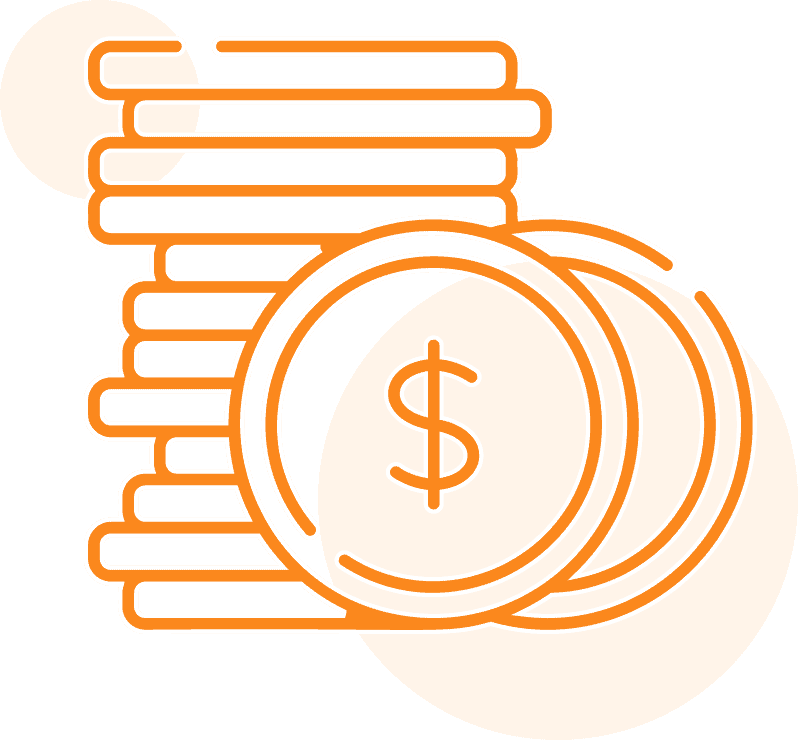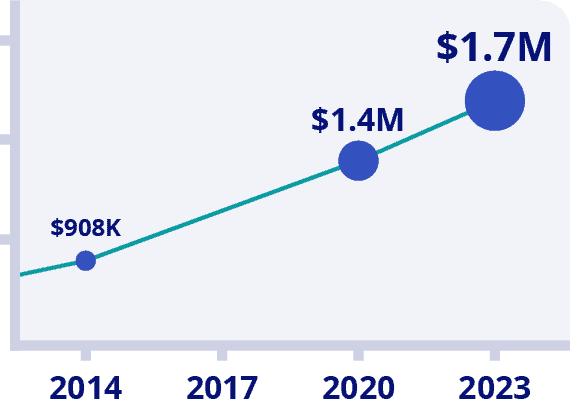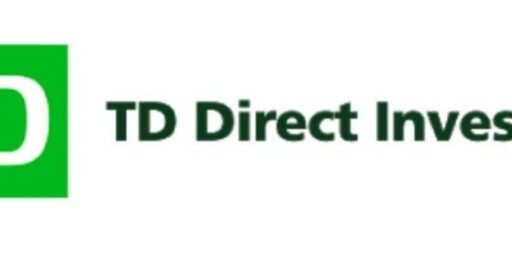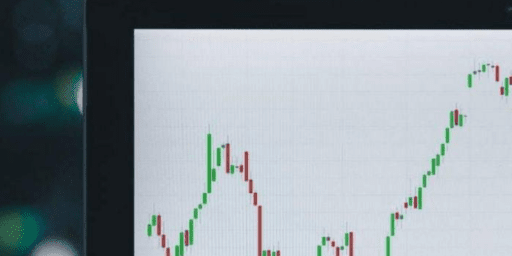49 Best ETFs in Canada – January 2026
When I started writing about Canadian personal finance roughly two decades ago, choosing the best ETFs in Canada was pretty easy. You could basically count the number of options on your fingers.
There were no Canadian all-in-one ETFs, no clever ticker symbols, and no glossy marketing pushing “new” leveraged fund strategies every quarter. ETFs were mostly the domain of serious index investors and a small group of DIY types who didn’t mind spending their weekends buried in spreadsheets.
But in 2026 it’s safe to say that ETFs will continue to evolve in all sorts of weird and wacky directions. My own portfolio still includes a meaningful allocation to Canadian dividend stocks, but low-cost Canadian ETFs that trade directly on the TSX now do most of the heavy lifting.
Over time, I’ve come to believe that while dividend investing has real behavioural benefits, broad-based index ETFs are often the superior tool for true diversification, especially once you step outside Canada.
Looking back to when I started investing, the fee difference alone is painful. If I could replace the high-MER international ETFs I owned years ago with today’s ultra-low-cost options, my portfolio would be ahead by tens of thousands of dollars.
Near the end of 2025 we saw Vanguard Canada cut ETF fees even closer to the bone, signalling that the race to the bottom is still alive and well. Increased competition among Canadian ETF providers has been a huge win for investors. Access to global markets has never been easier.
The downside is that the ETF label has also become a marketing free-for-all. At this point, nearly every financial company seems eager to package their *new idea* into an ETF wrapper, thus muddying the waters when trying to explain what ETFs are to the average new investor.
In a bid to gut through the noise, this guide to the best Canadian ETFs for 2026 has filtered aggressively for what actually matters: low costs, passive investing solutions, and simplicity. Every ETF on my top-49 list comes from providers with established track records, not flavour-of-the-month launches chasing the latest trend.

Best 2026 Broker Promo
Up To $5,000 Cash Back + Unlimited Free Trades
Open an account with Qtrade and get the best broker promo in Canada: $250 when you invest $1,000!
The offer is time limited - get it by clicking below.
Must deposit/transfer at least $1,000 in assets within 60 days. Applies to new clients who open a new Qtrade account by March 31, 2026. Qtrade promo 2026: CLICK FOR MORE DETAILS.
How I Choose Which ETFs to Include in My Portfolio
Due to the different goals and risk tolerances of various types of investors, what we decided to do was “compare apples to apples” and choose the top Canadian ETFs across multiple categories, focusing on three measurable areas.
1) MER fees
2) Breadth of diversification (how many stocks and bonds are included)
3) Tax efficiency (much more important to Canadians investing outside of their RRSP and TFSA)
My Top 11 Favourite BEST ETFs in Canada for 2026
- iShares Core Equity ETF Portfolio (XEQT) – The easiest possible ETF solution. Full XEQT review.
- Horizons S&P/TSX 60 ETF (HXT) – Best TSX ETF
- BMO Aggregate Bond Index ETF (ZAG)- Best Canada bond ETF
- Horizons S&P 500 Index ETF (HXS)- Best U.S stocks ETF for Canadians
- Vanguard FTSE Global All Cap ex Canada Index ETF (VXC) – Best international ETF for Canadians
- Vanguard All-Equity ETF Portfolio (VEQT) – Best all-in-one ETF. Full VEQT review.
- FTSE Canadian High Dividend Yield Index ETF (VDY) – Best dividend ETF
- Vanguard FTSE Canada Capped REIT Index ETF (VRE) – Best Canadian REIT ETF
- iShares Canadian Growth ETF (XCG) – Best Canada growth ETF
- Purpose High Interest Savings ETF (PSA) – Best Cash ETF
- TD Canadian Equity Index (TTP) – Best Canadian broad market ETF
We have dozens more choices for ETFs to invest in for Canadians, in Canada and internationally. Just keep on scrolling and reading our what are our authors and editors think of the best investing opportunities and specifically ETFs. You can hop over to the list of Canada’s best ETFs [49 options to choose from].
How To Buy ETFs in Canada for Cheap
The basic idea is that if stocks or bonds are individual bananas, then you first need to pick a store that you like to go to, and then decide which bunch of bananas you want.
1. Pick a Canadian online broker and sign up. Read our Qtrade review to see why we think it’s the best, view our Canadian broker comparison here.
2. While you’re in the sign up stage, do yourself a favour and sign up for a TFSA, and RRSP, and a non-registered account. You might never use one or two of them, but it’s easier to just do it all at once while you’re doing the initial setup.
3. Dedicate 30 minutes to understanding how “shopping at this store” works. Each broker will have a little tutorial that shows you how to type in your ETF ticker symbol, and then how many units of the ETF you want to buy.
4. Decide which “bunch of bananas” looks best, by reading our best ETFs in Canada guide above.
5. Once you have chosen your bunch of bananas, you pay for them by deciding how much money you want to invest at that time, and then dividing that number by the cost of the ETF.
For example, let’s say I have $1,000 to invest this month, and I want to use VEQT. I would enter the initials VEQT into my stock purchase screen, and see that one unit of VEQT costs $37.07. So I would divide $1,000 by $37.07 to get 26.97.
While I have close to enough money to purchase 27 units of VEQT, I can’t quite make it, so instead I enter “26” into my purchase screen, then click “market order” (you can also use limit order, it just adds a little complexity), and you will see a confirmation message pop up that says something like:
“Would you like to purchase 26 units of VEQT for $963.82?” .
Then you hit “Buy” – and boom – you just bought a batch of 10,000+ stock bananas from all over the world!
Our Exclusive Best ETFs in Canada List (49 Options)
Scroll down below the the comparison chart for full descriptions for each ETF, but without further ado, here’s the MDJ editorial team’s Best in Canada ETF List.
Type | Ticker | ETF Name | Composition | MER | # of Holdings |
TSX ETF | HXT | Horizons S&P/TSX 60 ETF | Canada Stocks | 0.08% | 60 |
TSX ETF | VCN | Vanguard FTSE Canada All Cap Index ETF | Canada Stocks | 0.06% | 205 |
TSX ETF |
XIC
|
iShares Core S&P/TSX Capped Composite Index ETF
| Canada Stocks | 0.06% | 219 |
TSX ETF | ZCN | BMO S&P TSX Capped Composite Index ETF | Canada Stocks | 0.06% | 221 |
Canada Bond ETF |
ZAG
|
BMO Aggregate Bond Index ETF
| Canada Government and Corporate Bonds | 0.09% | 1,800 |
Canada Bond ETF |
VAB
|
Vanguard Canadian Aggregate Bond Index ETF
| Canada Government and Corporate Bonds | 0.09% | 1,277 |
Canada Bond ETF |
ZDB
|
BMO Discount Bond Index ETF
| Tax Efficient Canada Bond Exposure | 0.10% | 339 |
Canada Bond ETF | VSB | Vanguard Canadian Short-term Bond Index ETF | Short Term Canada Bonds | 0.12% | 557 |
American ETF (CAD) to Buy in Canada | HXS | Horizons S&P 500 Index ETF | USA Stocks | 0.11% | 500 |
American ETF (CAD) to Buy in Canada | XUU | iShares Core S&P U.S. Total Market Index ETF | USA Stocks | 0.07% | 2551 |
American ETF (CAD) to Buy in Canada | VFV | Vanguard S&P 500 Index ETF | USA Stocks | 0.09% | 518 |
American ETF (CAD) to Buy in Canada | ZSP | BMO S&P 500 Index ETF (CAD) | USA Stocks | 0.09% | 506 |
International ETFs to Buy in Canada | VXC | Vanguard FTSE Global All Cap ex Canada Index ETF | The World’s Stocks – Minus Canada | 0.22% | 11,610 |
International ETFs to Buy in Canada | XAW | iShares Core MSCI All Country World ex Canada Index ETF | The World’s Stocks – Minus Canada | 0.22% | 8,209 |
International ETFs to Buy in Canada | VEE | Vanguard FTSE Emerging Markets All Cap Index ETF | Emerging Markets | 0.25% | 6.252 |
International ETFs to Buy in Canada | VIU | Vanguard FTSE Developed All Cap ex North America Index ETF | Developed Markets – Minus Canada and USA | 0.23% | 3,659 |
All in One ETF | XEQT | iShares Core Equity ETF Portfolio | All Global Stocks | 0.20% | 4 ETFs (thousands of underlying stocks) |
All in One ETF | VEQT | Vanguard All-Equity ETF Portfolio | All Global Stocks | 0.24% | 7 ETFs (thousands of underlying stocks) |
All in One ETF | ZGRO | BMO Growth ETF | Global Stocks and Bonds (80% stocks, 20% bonds) | 0.20% | 7 ETFs (thousands of underlying stocks) |
All in One ETF | XGRO | iShares Core Growth ETF Portfolio | Global Stocks and Bonds (80% stocks, 20% bonds) | 0.20% | 8 ETFs (thousands of underlying stocks and bonds) |
All in One ETF | VGRO | Vanguard Growth ETF Portfolio | Global Stocks and Bonds (80% stocks, 20% bonds) | 0.24% | 7 ETFs (thousands of underlying stocks and bonds) |
All in One ETF | VBAL | Vanguard Balanced ETF Portfolio | Global Stocks and Bonds (60% stocks, 40% bonds) | 0.24% | 7 ETFs (thousands of underlying stocks and bonds) |
All in One ETF | XBAL | iShares Core Income Balanced ETF Portfolio | Global Stocks and Bonds (60% stocks, 40% bonds) | 0.20% | 8 ETFs (thousands of underlying stocks and bonds) |
All in One ETF | ZBAL | BMO Balanced ETF | Global Stocks and Bonds (60% stocks, 40% bonds) | 0.20% | 7 ETFs (thousands of underlying stocks and bonds) |
All in One ETF | VCNS | Vanguard Conservative ETF Portfolio | Global Stocks and Bonds (40% stocks, 60% bonds) | 0.25% | 7 ETFs (thousands of underlying stocks and bonds) |
All in One ETF | XCNS | iShares Core Conservative Balanced ETF Portfolio | Global Stocks and Bonds (40% stocks, 60% bonds) | 0.20% | 8 ETFs (thousands of underlying stocks and bonds) |
All in One ETF | ZCON | BMO Conservative ETF | Global Stocks and Bonds (40% stocks, 60% bonds) | 0.20% | 7 ETFs (thousands of underlying stocks and bonds) |
All in One ETF | VCIP | Vanguard Conservative Income ETF Portfolio | Global Stocks and Bonds (20% stocks, 80% bonds) | 0.25% | 7 ETFs (thousands of underlying stocks and bonds) |
All in One ETF | XINC | iShares Core Income Balanced ETF Portfolio | Global Stocks and Bonds (20% stocks, 80% bonds) | 0.20% | 8 ETFs (thousands of underlying stocks and bonds) |
Canada Growth Stock ETF | XCG | iShares Canadian Growth ETF | Canada High Growth Stocks | 0.55% | 47 |
Canada Dividend ETF | CDZ | S&P/TSX Canadian Dividend Aristocrats Index Fund | Canadian Dividend Stocks | 0.66% | 90 |
Canada Dividend ETF | XDV | iShares Canadian Select Dividend Index ETF | Canadian Dividend Stocks | 0.55% | 30 |
Canada Dividend ETF | VDY | FTSE Canadian High Dividend Yield Index ETF | Canadian Dividend Stocks | 0.22% | 60 |
Canada Dividend ETF | XEI | IShares Core S&P/TSX Composite High Dividend Index ETF | Canadian Dividend Stocks | 0.22% | 75 |
Canada Dividend ETF | ZDV | BMO Canadian Dividend ETF | Canadian Dividend Stocks | 0.39% | 64 |
Canada Dividend ETF | XDIV | iShares Core MSCI Canadian Quality Dividend Index ETF | Canadian Dividend Stocks | 0.11% | 21 |
Canada REIT ETFs | VRE | Vanguard FTSE Canada Capped REIT Index ETF | Canada REIT | 0.39% | 19 |
Canada REIT ETFs | ZRE | BMO Equal Weight REITs Index ETF | Canada REIT | 0.61% | 22 |
Canada REIT ETFs | XRE | IShares S&P TSX Capped REIT INDEX ETF | Canada REIT | 0.60% | 20 |
Canada REIT ETFs | RIT | CI First Asset Canadian REIT ETF | Canada REIT | 0.97% | 36 |
Specialty Canadian ETF | VRIF | Vanguard Retirement Income Fund | Worldwide Income ETF | 0.32% | 13,337 stocks, 18,330 Bonds |
Specialty Canadian ETF | BTCC.B | Purpose Bitcoin ETF | Bitcoin ETF | 1.34% | N/A |
Specialty Canadian ETF | QQC-F | Nasdaq 100 ETF | 100 Largest Tech Companies in USA | 0.21% | 100 |
Specialty Canadian ETF | AVDV | Avantis International Small Cap Value ETF | Small Cap Value from Non-USA Countries | 0.36% | 1,181 |
Specialty Canadian ETF | ZESG | BMO Balanced ESG ETF | Socially Responsible Investing | 0.20% | 6 ETFs (thousands of underlying stocks and bonds) |
Cash ETF | PSA | Purpose High Interest Savings ETF | Money Market ETF | 0.15% | 5 |
Cash ETF | HSAV | Horizons Cash Maximizer ETF | Money Market ETF | 0.20% | 3, but 99.41% in National Bank |
Cash ETF | CASH | Horizons High Interest Savings ETF | Money Market ETF | 0.11% | 4 |
This is the short list of best Canadian ETFs taken from the 37 ETF providers in Canada, including BMO Asset Management, Vanguard Investments Canada Inc., BlackRock Canada, and Horizons ETFs Management (Canada) Inc.
If you want the easiest possible way to diversify your money, then buying an all-in-one ETF is your best bet. If you open a Qtrade discount brokerage account, you can buy and sell the VEQT ETF for free. It’s the best deal going in Canada. Robb Engen over at Boomer and Echo has written extensively about how he uses VEQT for the entirety of his investment portfolio.
If you want the lowest cost indexed portfolio – along with the ability to do your own portfolio math and overweight Canadian stocks – go with the combination of HXT, VXC, and ZAG.
If the goal for your portfolio is to generate income (as opposed to maximizing growth opportunities while cutting costs) then looking at VRIF, VRE, and VDY are great places to start.
See below for a more detailed explanation on our best in class.
Check out our article on how to buy stocks in Canada and our Canadian online brokers comparison for a detailed look on how to buy ETFs in Canada.
Best Canadian Stock Market ETF
It is amazing how much easier and cheaper it is to invest in a Canadian stock market ETF today than it was when I started investing roughly 15 years ago.
Competition has worked its magic and fees have come down substantially across the asset class. You can’t go wrong with any of our top 4 options: HXT, VCN, XIC, or ZCN.
Best In Class: Horizons Horizons S&P/TSX 60 ETF (HXT)
- Lowest Fee (after rebate) of 0.04%
- Top 60 Stocks in Canada
- Swap-based ETF means low tracking error
- Perfect for tax-efficient investing
I personally love HXT not only for its slight cost advantage, but also for its tax advantages in non-registered accounts. If you’re investing in a non-registered account or a corporate account, turning those Canadian dividends into tax-deferred capital gains can make a big difference.
Honourable Mentions:
- Vanguard FTSE Canada All Cap Index ETF (VCN)
- iShares Core S&P/TSX Capped Composite Index ETF (XIC)
- BMO S&P TSX Capped Composite Index ETF (ZCN)
- All have identical low MERs of 0.06%
- All give access to some smaller-cap Canadian stocks
- Excellent value – especially in an RRSP or TFSA
Best Canada Bond ETFs
Sure, there isn’t a lot of love out there for bonds these days. That said, they can still perform a valuable stabilizing function for your portfolio. When it comes to Bond ETFs, we’re all about getting low fee access to super-stable government and blue-chip corporate bonds.
Best In Class: BMO Aggregate Bond Index ETF (ZAG)
- Ultra Low MER 0.08%
- Access to broadest diversification of bonds
- Safe and stable – perfect for rebalancing
Honourable Mentions:
- TD Canadian Aggregate Bond Index (TDB
- Vanguard Canadian Aggregate Bond Index ETF (VAB)
- BMO Discount Bond Index ETF (ZDB)
- Vanguard Canadian Short-term Bond Index ETF (VSB)
- TDB is slightly cheaper than ZAG, but ZAG gives you access to a broader range of bonds (1,600 vs 1,100 and has more liquidity)
- VAB almost identical to ZAG
- ZDB has some interesting tax efficiency features for non-registered accounts
- VSB uses only short-term bonds, so the average length of the bond it holds is shorter than the others
Best USA Stocks ETF for Canadians
If this is the type of ETF you are most interested in, i suggest you also read our more detailed breakdown and comparison in this best Canadian dollar ETFs for U.S equity article.
Best in Class: Horizons S&P 500 Index ETF (HXS)
- Slightly higher MER than competitors
- Valuable tax-efficient structure can save investors $$$ on dividend taxation
- Almost zero tracking error due to swap-based structure
Honourable Mentions:
- iShares Core S&P U.S. Total Market Index ETF (XUU)
- Vanguard S&P 500 Index ETF (VFV)
- BMO S&P 500 Index ETF (ZSP)
- TD US Equity Index ETF (TPU)
- XUU and TPI have the lowest MER fee at 0.07%
- XUU has the broadest exposure to smaller American stocks
- VFV, TPU, and ZSP are nearly identical in terms of holdings and fees
Best International ETFs for Canadians
Best In Class: Vanguard FTSE Global All Cap ex Canada Index ETF (VXC)
- Super easy access to the entire world of stocks outside of Canada
- Widest possible exposure (wider than XAW)
- Perfect for the “Two ETF Portfolio”
Honourable Mentions:
- iShares Core MSCI All Country World ex Canada Index ETF (XAW)
- Vanguard FTSE Emerging Markets All Cap Index ETF (VEE)
- Vanguard FTSE Developed All Cap ex North America Index ETF (VIU)
- XAW is a close second to VXC offering a slightly lower MER for less overall diversification
- VEE is perfect for targeted investors who want instant access to emerging markets
- VIU is perfect for targeted investors who want instant access to developed markets outside of the USA and Canada
Best Broad Market Canadian ETF
While the TSX 60 Composite Index has been a reliable benchmark for “Canadian stocks” there are lesser-known indexes that are debatably a better measure of the entire Canadian stock market. One such index is the Solactive Broad Canada Index.
The difference between the two indexes is that while the TSX 60 Composite index tracks the 60 largest companies in Canada (ranked by their market capitalization), the Solactive Broad Canada Index tracks the 270 largest companies.
Now, that sounds like a big difference, but in practice it’s actually not that big a deal. The 60 biggest companies are A LOT bigger than the next 210 companies – so the performance of the two indexes is going to be pretty close to the same. In fact, Canada’s largest companies have historically had a bit of an advantage over the smaller companies that make up the bottom of the broader Canada index.
That said, one interesting aspect of the TD Canadian Equity Index ETF is that it has a slightly lower MER due to its lower index-licensing costs. That means Solactive is charging TD less than S&P charges other ETF providers. It’s a minutely-small difference, but it’s interesting to note.
Perhaps the best use of TTP is when it comes to harvesting a capital loss in a given year. For example, say you were investing in XIC, HXT, or VCN to get your Canadian stock exposure. These two ETFs do not use the Solactive Broad Canada Index, and consequently, you could sell your units of XIC, HXT, or VCN, deduct the investment loss from your taxes, and immediately buy TTP.
This would avoid the superficial loss rules, while at the same time giving you portfolio exposure to a very very similar set of investments. It’s possible that you might gain or lose a few hundredths of a percent in returns in the month that you own TTP (depending on how the smallest 200 or so Canadian companies did) before selling those units and buying back your units of the initial ETF that you had.
Best Canadian All-in-One Portfolio ETFs
My article on the Best Canadian All-In-One ETFs (also known as portfolio ETFs) is actually one of the most popular articles on MDJ.
I initially wrote that article when Vanguard forever changed the Canadian investing world a few years ago, and have updated it every few months since, as more and more ETF providers have decided to create their own asset allocation ETFs.
If you’re looking for a detailed primer on exactly where your investing dollars will end up if you purchase an all-in-one ETF, we’ve got you covered. In fact, there are many happy Canadian DIY investors that have weighed the pros and cons, and decided to simply buy one ETF across all of their accounts (RRSP, TFSA, non-registered, etc) and never worry about rebalancing math or saving a few tenths-of-a-percent on tax efficiency every again!
All-in-one ETFs promote a purely passive mindset and actually present real value to investors by encouraging them to leave well enough alone! If you’re not sure what I’m referring to, make sure to read Morningstar’s “mind the gap” studies. This annual look at investor behaviour shows how badly most investors do when they try to time getting and out of the market. Spoiler alert: They basically all lose money.
Simple check out what all-in-one ETFs are available in Canada. Really think about your risk tolerance, and what the right asset allocation mix is for you going forward… then just set it and forget it!
Best Canadian Dividend ETFs
Choosing the Best Dividend ETF in Canada has been our jam at MDJ since they first came to Canada. While many readers now prefer to pick their own specific Canadian Dividend Stocks, there is no denying the straightforward, simple value of instantly diversifying your Canadian dividend income with one ETF purchase.
As more of the original readers who have stuck with MDJ for over a decade entered into retirement (at a wide variety of ages) the focus on generating income as opposed to risk-embracing growth, has pulled to the forefront. Fortunately, the Canadian market offers some of the most consistent dividend payers around!
If you are looking at other ways to optimize your retirement income and come up with a solid retirement plan, then I recommend checking out Kyle’s online course titled ‘Worry Free Retire’. In it, Kyle covers all the key elements that make a successful retirement plan, and the common mistakes most Canadians make.
Are You Saving Enough for Retirement?

Canadians Believe They Need a $1.7 Million Nest Egg to Retire
Is Your Retirement On Track?
Become your own financial planner with the first ever online retirement course created exclusively for Canadians.
Try Now With 100% Money Back Guarantee*Data Source: BMO Retirement Survey
Best Canadian REIT ETFs
Similar to Canadian Dividend ETFs, Real Estate Investment Trusts (REITs) hold a special place in the income-investors heart. While the asset class has had a bit of a rough go of it lately, in an income-starved world they offer a simple way to invest in real estate. (Something many Canadians are after in their portfolios.)
You can also read my guide to investing in Canadian REITs and our comparison between holding a Canadian REIT ETFs and an individual REIT.
Best In Class: Vanguard FTSE Canada Capped REIT Index ETF (VRE)
- By far the lowest MER 0.38%
- Solid exposure to a wide variety of real estate sectors
- Similarly, excellent geographical diversity
Honourable Mentions:
- BMO Equal Weight REITs Index ETF (ZRE)
- IShares S&P TSX Capped REIT INDEX ETF (XRE)
- Slightly more holdings than VRE
- Significantly higher cost – important for an income-specific product
Best Canada Growth ETF: iShares Canadian Growth ETF (XCG)
While many MDJ investors gravitate toward mature companies with a steady record of dividend increases, there are always investors out there with an appetite for risk, and who want growth at all potential costs. For them. XCG rules the roost.
- Relatively high MER at 0.55% that I hope to see decrease with more competition
- Quick access to Canada’s fastest growing tech companies
- Has performed quite well over the last couple of years
Best Specialty Canadian ETFs
This was our catch-all category for the best Canadian ETFs that didn’t really fit neatly into any category. Each of these does something completely different:
Best Retirement Income ETF: Vanguard Retirement Income Fund (VRIF)
- Invested in a wide variety of investment grade bonds from around the world, as well as a sprinkling of stock indexes
- Great option for a retiree who doesn’t want the risk of a pure-stock portfolio
- Stated goal is a consistent 4% return each year (after fees)
- MER of 0.32%
Best Bitcoin ETF: Purpose Bitcoin ETF (BTCC.B)
- Canada’s most popular and liquid Bitcoin ETF
- Easy exposure
- Bitcoin isn’t really my thing personally… but if you want an easy way to get in on it…
- MER of 1.00% is indicative of the fees in this space
Best Technology ETF: Invesco Nasdaq 100 ETF (QQC-F)
- If you think the tech sector is going to experience explosive growth going forward, the easiest way to invest using Canadian Dollars is QQQ
- Tracks the Nasdaq-100 index (100 biggest tech companies in the USA)
- A very reasonable MER of 0.25%
Best Value ETF: Avantis International Small Cap Value ETF (AVDV)
- Full credit to Ben Felix for this recommendation and for his push to explain factor investing to Canadians
- Main idea here is that over the long-term small-cap value stocks tend to outperform the larger market-cap indexes (such as the S&P 500 or the TSX 60)
- 0.36% MER
Best ESG ETF: BMO Balanced ESG ETF (ZESG)
- Created for investors looking to invest alongside their socially responsible values
- 60% Equity, 40% Fixed Income
- 50% Canada, 35% USA, 15% Other
- A competitive 0.20% MER
Best Canadian Cash ETFs
Best in Class: Purpose High Interest Savings ETF (PSA)
- Current best overall rate
- All Cash ETFs are quite similar
- Cash ETF returns will go up and down depending on interest rates
Honourable Mentions:
- Horizons Cash Maximizer ETF (HSAV)
- Horizons High Interest Savings ETF (CASH)
If you want a safe place to park short-term money inside your brokerage account, cash ETFs are a simple, low-risk option. They hold high-interest savings deposits at major Canadian banks and pass along that interest to investors. Rates move up and down alongside the Bank of Canada’s policy rate, so they’re especially appealing when interest rates are higher. Because they’re negotiating with the major banks with such a large pool of money, they can generally get better high interest rates than individual savers can.
Right now, the Purpose High Interest Savings ETF (PSA) offers the most competitive yield and is our top pick. All Canadian cash ETFs are quite similar, but PSA’s rate and liquidity give it the edge.
Best Canadian ETFs for RRSP and TFSA
For the vast majority of Canadians with investments in the stock market, their entire portfolio consists of their RRSP and TFSA.
Hey, if you can consistently max out those registered accounts each year, you’re doing pretty darn well!
When it comes to choosing the exact best ETFs for your RRSP and TFSA it boils down to the following questions:
1) How much do you value simplicity?
2) Are you comfortable doing a little math a few times a year in order to rebalance your portfolio and cut MER fees to the absolute bone?
3) Do you want a specific tilt toward Canadian stocks, income-producing investments, or another niche?
Depending on your answers to these questions, the best ETF in Canada will vary from person to person.
When making a recommendation to a broad audience I absolutely love VEQT for young investors, and then the rest of the all-in-one ETF family. There is just too much value to keeping it simple, and getting people to take action by logging into their online broker account one a month and buying the same ETF over and over again.
If we want to re-balance our portfolios in the old-school way, we can shave a few MER points off by using HXT, ZAG, and XUU for our Canadian equity, Canadian bond, and American equity portions respectively.
Finally, if you’re just looking for a very safe and stable pure income play, I really think that VRIF is worth a close look.
Canadian ETF: Best Returns in 2025 and 2026
While we wait for 2026 to play out a bit more, I wanted to illustrate just how random annual returns can be by looking at the best performing ETFs over the last few years. You can see that while 2023 was dominated by energy and commodities, and 2024 was the year for crypto, 2025 was yet again a completely different animal.
I’m including these lists not to in any way try and look for patterns, but instead to explain why you shouldn’t be using annual ETF investment returns to try and predict which will be the best performers going forward!
2023 Best Performing Canadian ETFs
- Ninepoint Energy Fund (NNRG)
- Ishares S&P 500 TSX Capped Energy Index ETF (XEG)
- BMO S&P TSX Eql Weight Oil Gas Index ETF (ZEO)
- Ishares Global Agri Index ETF (COW)
- Horizons US Dollar Currency ETF (DLR)
2024 Best Performing Canadian ETFs
- GI Galaxy ETF USD (BTCX)
- Purpose Bitcoin ETF (BTCC)
- GI Galaxy Ethereum ETF USD (ETHX)
- BMO Equal Weight US Banks Index ETF (SBK)
- Horizons Global Semiconductor ETF (CHPS)
2025 Best Performing Canadian ETFs
- Global X Gold Producer Equity Covered Call ETF (GLCC)
- Global X Silver ETF (HUZ)
- MegaLong (3X) Canadian Banks Daily Leveraged Alternative ETF (BNKU)
- Dynamic Active Global Gold ETF (DXAU)
- Global X Enhanced Gold Producer Equity Covered Call ETF (GLCL)
If you had put a large part of your portfolio into each of the prior year’s winners, you’d have awful returns right now. Instead, stick to diversifying your portfolio as we detailed above.
The fact that none of last year’s best performers aren’t on this year’s list is not an anomaly, it’s very common. That’s why you won’t see any of these niche ETFs on my Best ETFs list.
It’s quite likely that at the end of 2026, there will be an entirely different weird looking set of top ETFs. If the market goes down, some leveraged-short ETF will be the best performing ETF. In fact last year in my January 2025 update for this column I literally said, “Gold prices could go up, so a 3x gold ETF will lead the pack.” Didn’t really put a lot of thought into that one… but it looks pretty good in hindsight!
The fact is that the vast majority of investors who are successful over the long term don’t spend time worrying about the best performing ETFs from year to the next, they just diversify, and focus on controlling what they can control.
Types of ETFs in Canada
It used to be that buying an ETF in Canada meant that you were passively investing in a big broad index of ETFs. But now there are so many different types of ETF on the market, that it can be difficult to determine what exact investment that you’re buying.
In fact, there are now more ETFs than stocks in most developed country’s stock markets (which is pretty crazy when you think about it). The vast majority of these ETFs are basically irrelevant and not worth your time, but here’s kind of a quick primer on the different types of ETFs in Canada.
| Type of ETF | Description of What’s In the ETF |
| Index Fund (Equities) | The best type of ETF – cheap, basic tracking of an index like the TSX 60 or S&P 500 |
| Index Fund (Fixed Income) | Tracks an index of bonds or money market funds |
| Index Fund (Portfolio ETF) | A balance of the first two types of ETFs – see this article for more on all in one ETFs or “Portfolio ETFs” |
| Ex-North America | This is similar to an equity index fund, but only includes stocks from outside of North America |
| Developing Markets | This is similar to an equity index fund, but only includes stocks from developing countries (as opposed to developed markets such as Canada) |
| Commodity | Focuses on the prices of a single commodity such as gold or soybeans |
| Country-specific | Is usually an equities index fund, but only includes equities from that specific country |
| Real Estate | Invests in multiple Real Estate Investment Trusts (REITs) |
| Crypto | An ETF that tracks the price of Bitcoin or other cryptocurrencies |
| Sustainable | An ETF that tracks a portfolio of bonds or companies that have earned an environmental stamp of approval |
| Sector/Industry | Focuses on all of the companies within a certain industry such as computer processing chips or pipelines |
Canadian ETFs Pros
The main pros or reasons to invest in Canadian ETFs include:
1) Instant diversification. There is simply no easier way to efficiently split your investment dollar up into so many baskets. The more diversification you have, the less risky your overall investment portfolio becomes.
2) The price has gotten incredibly cheap. Due to competition between the major Canadian ETF companies, the price on the most popular ETFs is now down to .05%-0.15% MER. When you compare that to the 2.5% MER of most Canadian mutual funds recommended by banks – we’re talking a sliver of the price!
3) Convenience. Because ETFs trade like a stock, you just open up an online broker account, and you can instantly buy and sell ETFs with ease.
4) More choice than ever before. There are now more Canadian ETFs to choose from than ever before. In fact, there are so many, I actually can’t imagine a type of investment exposure you’d want, that you can’t get through today’s ETF market.
Canadian ETFs Cons
The main ETF Cons in Canada (aka “Bad stuff about ETFs”) include:
1) More choice than ever before. Wait – I thought this was a good thing??? The truth is that most people don’t actually need choice when investing. Just a simple index ETF (which has been available for decades) is almost always the best way to go.
2) It can be harder to DIY. I think that opening up a brokerage account and buying an ETF is very doable for most people. But that said, it is a big enough mental hurdle that it often intimidates many people and substantially delays getting started in investing.
3) Marketing for actively-managed ETFs and high-fee ETFs. The is the main con in my opinion, as it used to be that the phrase “ETF” was synonymous with “cheap index investing option.” This is not true any more, as fund companies have sought to “muddy the waters” when it comes to snagging your ETF investment cash. Stay vigilant when it comes to choosing the best ETFs for your needs!
Top Canadian ETFs: FAQ
ETFs vs Mutual Funds – Why MER Can Make a Huge Difference
When it comes to the ETFs vs mutual funds debate in Canada, it really boils down to one thing: fees. Specifically, how much of your hard-earned investment growth is quietly getting siphoned off each year.
That’s where the Management Expense Ratio (MER) comes in. This annual fee gets charged whether your investment goes up, down, or sideways – and over the course of decades, it can quietly take a massive bite out of your portfolio. Even a 1% difference might not sound like much, but it can add up to six figures over a lifetime of investing.
Compare the average Canadian equity mutual fund to a typical ETF, and you’ll see mutual fund fees are often 10x to 40x times higher. That fact alone is enough to push most new investors toward ETFs – and yet, mutual funds still hold the majority of assets in Canada. (Thanks mostly to big bank advisors and outdated workplace plans.)
But the case for ETFs isn’t just about the lower fees.
- They’re easy to buy and sell. With any basic online brokerage account, you can trade ETFs just like stocks. No need to book a meeting or sit through a sales pitch.
- They’re more tax-efficient. Most ETFs generate fewer taxable events compared to actively managed mutual funds.
- You’re in control. You can rebalance on your own schedule, choose your allocations, and avoid the one-size-fits-all approach that many mutual funds still push.
In today’s world of Canadian DIY investing, these aren’t small details. They’re the core reasons why ETFs have taken over, and why this list of Canada’s best ETFs is built to help you skip the guesswork and start investing with confidence.
Canadian Hedged ETFs vs Non-Hedged ETFs
When you buy a foreign-equity ETF in Canada, you are kind of taking two investment rides at once: the stock market ride and the currency ride. A non-hedged ETF leaves the currency piece alone, so your CAD return reflects both the underlying stock performance and the move in the foreign currency versus the Loonie. A currency-hedged ETF tries to cancel most of that currency movement by using forward contracts, so your CAD return should track the local-market return more closely.
It sounds a bit more complicated than it actually is. Just remember that your Canadian Dollars will go up and down and value. At the same time, the value of the investments (whether the investment is individual stocks, stock ETFs, or bond ETFs) will also go up and down in value.
The fact of the matter is that currency markets are even harder to predict than stock markets. No one has any idea if the Canadian Dollar is going to go up or down versus the rest of the world’s currencies. I’d argue that aside from the USA, the CAD is on pretty solid footing against everyone else over the long term. I’m definitely not worried enough to incur the costs that come with currency hedging. To be clear, I don’t own any currency-hedge Canadian ETFs in my portfolio.
For the sake of explanation though, it’s possible to use a currency-hedged ETF such as VUS to get the same stock exposure as VUN – but with a Canadian Dollar hedge built in. A worldwide example would be XEH, which is a hedged version of XEF.
One of the biggest advantages of holding unhedged US or international equities is the built-in diversification they provide when Canada’s economy falters. The Canadian Dollar often moves in the same direction as oil prices, so when oil takes a dive or our domestic economy hits a slowdown, the Loonie tends to weaken.
In those scenarios, unhedged foreign holdings can help offset the pain because the value of your USD or Euros increases in CAD terms. That extra return boost can act like a shock absorber for your portfolio at the exact moment Canadian assets are struggling. If you choose a fully hedged ETF, you effectively remove this potential cushion, leaving your returns more tied to domestic performance.
It’s also worth noting that currency hedges are never perfectly applied. The goal of a hedge isn’t to beat the market, but to neutralize currency fluctuations. In practice, achieving a perfect offset is impossible due to factors like rolling forward contracts, differences in interest rates between countries, and execution costs. These small discrepancies can leave you with minor, unpredictable gains or losses over time. And because you’re paying management fees to maintain the hedge, you’re often absorbing ongoing costs for a result that doesn’t fully deliver on its promise.
In short, the hedged-juice just isn’t worth the squeeze!
Which Canadian ETF Should You Buy?
There’s no universal best investing that works for everyone. As we looked at earlier, it’s not as easy as just seeing which ETFs performed the best last year, and tossing some money into those pots.
A large chunk of Canadians simply want an investment solution that’s straightforward and doesn’t require constant tinkering. That’s why trying to name a single best Canadian ETF without context is a bit of a fool’s errand. Your goals, timeline, and tolerance for ups and downs matter far more than any ranking.
It’s also worth being honest about something the industry doesn’t like to admit. Nobody can reliably tell you which ETF will outperform over the next few months or even the next year. Short-term market moves are noisy and unpredictable. What investors can control is far more important: keeping costs low, choosing a sensible asset mix, and sticking with a strategy that matches their risk tolerance and time horizon.
The encouraging part is just how competitive the Canadian ETF landscape has become. When ETFs first started gaining traction here in the mid-2000s, choices were limited and often expensive. Today, DIY investors have access to nearly 1,500 ETFs spanning everything from simple global index portfolios to bonds, income strategies, and cash-like options. Whether you want to be hands-on or completely hands-off, the building blocks are there.
As we head into 2026, Canadians now hold roughly $720 billion to $750 billion in ETF assets with record inflows continuing throughout 2025. That’s a massive leap from just a few years ago and a clear sign that ETFs have moved from niche products to a core part of how Canadians invest.
Perhaps the crazier statistic is that traditional mutual funds still control well over $2 trillion in assets in Canada, despite fees that remain stubbornly high by global standards. The contrast is hard to ignore. Over time, cost differences add up, and I’m hoping more and more Canadians start doing the math for themselves.
Our list of the best ETFs in Canada for 2026 reflects the reality that we can’t pick which stocks or leverage strategies will outperform over the next 12 months. Rather than chasing trends or short-term performance, the focus stays on broad diversification, low costs, and products that are easy to understand and stick with. These are the kinds of ETFs I wish had been available when I was starting out.
And if there’s an ETF you use and love that didn’t make the cut, let us know in the comments below!











Thank you for sharing this comprehensive list. Being a mother of two who just started on my FIRE journey last year. I am planning to invest in to ETFs moving forward so that I could achieve my FIRE goals quicker. This list will definitely come in handy to achieve this target.
Thanks for the detailed posting. Would you still consider this list to be appropriate for the current environment, or would there be any tweaks ? (April 2025). I decided to sell VGRO and purchase individual ETF’s instead, so I can control the % of each. Given what’s happening in the US, I wanted to reduce my exposure in the US, and with an all in one ETF, that’s not easy to do.
Good day, I am trying to understand when to buy a etf. For example when the market is so high aren’t the etf’s going to be high as well and what goes up must come down in time. How does one determine what is a good price on a etf? also when to sell the etf at a good price if people panic won’t the sell off reduce the etf price and one can lose all their earnings really.
I didn’t see zqq mentioned. Did I miss it? If it wasn’t mentioned why not? Don
A correction in your article above. VEQT is not on Qtrades free etf purchase list. XEQT is but not VEQT. In fact, there are very few Canadian Vanguard etf’s on the list.
love your blog – Paul
Error still there a year later. The only Vanguard Canadian ETF on the 100+ list is VBG, an ex-US aggregate bond fund. I find the list of 100+ ETF really limiting in Qtrade, I use the Ishares all-in-one funds, XEQT, XBAL, XINC for my daughters RESP, and have XEQT and CGR in a small RRSP, but not having access to most of the 48 ETFs listed above doesn’t make me want to leave CI Direct Trading (my bigger RRSP and TFSA) for Qtrade.
Do you still like HXT best for Canadian equity after they hiked their MER to 0.08% this year?
Or would VCN/XIC be preferred?
A question regarding HXS vs. other options, such as ZSP: the effective MER + swap fee of 0.3% for HXS is distinctly higher than the MER for ZSP or VFV. So, in a registered account, wouldn’t it make more sense to pick ZSP or VFV over HXS? I think this not considered or not clarified enough.
You have to balance that higher MER vs the money saved on dividend witholding taxes and dividend income taxes MI.
Thanks FT!
Was wondering the main reasons why HXS versus VFV if inside an RRSP? What about outside an RRSP? Tax efficiencies was mentioned, but not understood by me as the reader, help?
Also for the best international ETF to own as a Canadian VXC is mentioned which I do own, but I do also own VFV making me over exposed to the US Equities market.
Was wonder if there was a product like VXC where we get exposure to emerging markets like China and India but is Ex North America. – I see VIU mentioned, but I don’t see any Chinese or Indian holdings in that one?
Here’s my current porfolio and weighting in case you have any advice on it:
XIC.TO – 30%
VFV.TO – 30%
VXC.TO – 30%
VSB.TO – 10%
Thanks for your help!
-Jared